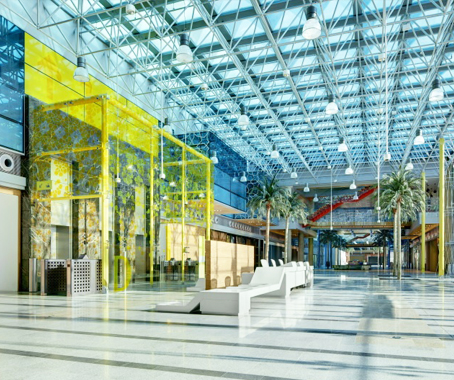
The new headquarters for Sultanate of Oman’s largest bank looks to change the way its employees work, writes Janice Seow.
Leading interior design firm Geyer, in partnership with local architects and designers, has developed a 320,000 square feet headquarters for Bank Muscat that is setting new benchmarks for workplace design in the Middle East.
Story continues below advertisement
The intention was to consolidate 8 existing locations into a single facility that would support sustainable growth, promote innovation and collaboration, attract and retain a diverse workforce, and improve efficiencies.
Cultural overtones are evident throughout, with the contemporary design strongly referencing Islamic architectural elements.
Story continues below advertisement
Key features and amenities that support people gathering have also been incorporated, extending to the families of employees and the broader community within public areas.
Story continues below advertisement
The 4 campus-style buildings are linked by an interactive, glass covered main ’street’. Open to the public, it features, among other things, a Bank Muscat branch, restaurants, and an auditorium.
The arrangement of landscaping creates intimate seating areas and improves pedestrian flow through the street to the multiple lifts accessing the workplace.
There is also visual access between the ’street’ and workplace, enhanced by balconies, sky bridges and mashrabiyas.
Importantly, employees are encouraged to view the entire building as their workplace, not just their desk.
“The physical delineation between the public on the ’street’ and the Bank Muscat work environment has enabled greater opportunity to move freely between work floors and to use the amenity spaces provided in the building without the need to pass through security barriers,” says Geyer in its press statement.
“This change in itself is significant in the impact it makes to building functions and interaction between people.”
Interconnecting stairs and sky bridges also provide additional opportunities for connection throughout the environment.
Reflecting the culturally diverse employee demographic, the major breakouts and local hubs are themed, providing variety and choice for people to collaborate and work away from their desks.
In addition, modular spaces and bench style settings allow the workplace to evolve and respond to change, while the provision of shared, non-dedicated work areas means that significant staff growth can be more easily accommodated over time.
Geyer says its client hopes the building will help to break down business silos, encourage a more transparent, egalitarian workstyle, and support knowledge development and innovation.
Geyer
geyer.com.au